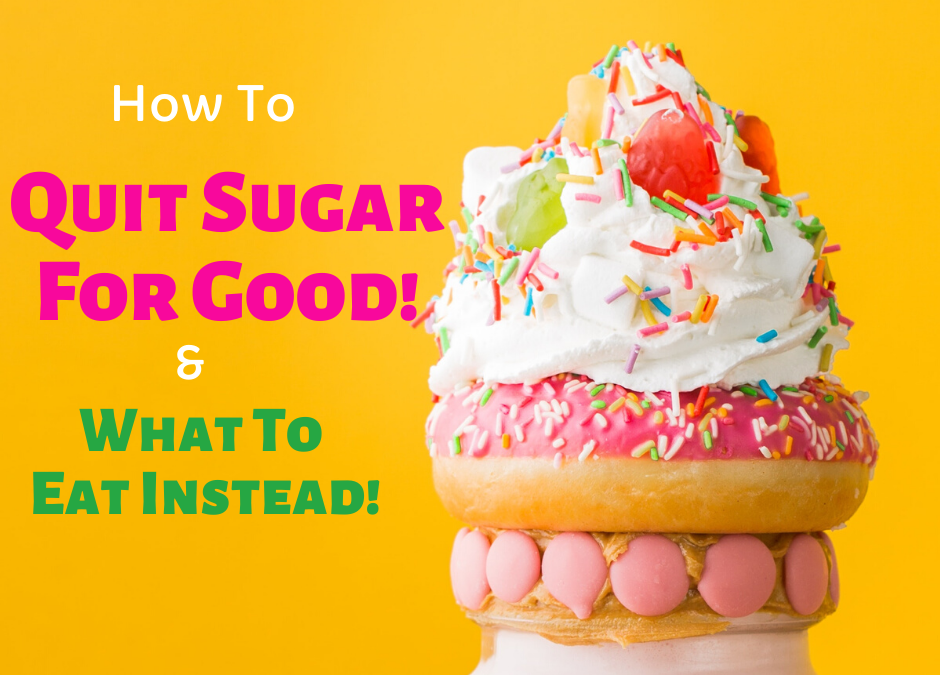As Doctors we write about evidence- based facts and with that in mind select products we believe to be the best for our readers. Thelifestylecure.com is a participant of the amazon associates program and we may earn a very small commission from qualifying purchases at no extra cost to you.
I, like most people have always had a sweet tooth and would choose to indulge in sugary treats if given the chance!
Whether it was the sweet taste of syrup drizzled over a stack of pancakes or the decadent cream cheese filled pastries, both would call out my name and who was I to oblige?
However, over time I realized the negative effects sugar had and how it made me feel. And I honestly didn’t think that I was even consuming that much sugar but once I cut down and quit sugar, it hit me how much it had controlled my life and the impact it left on my health.
Lets take a look at the basics of sugar and educate ourselves on how sugar acts within the body.
Table of Contents
Types Of Sugar
According to the American Heart Association there are two types of sugars found in the typical American diet:
Types of Sugars
1) Naturally occurring sugars – found naturally in fruits and milk
2) Added sugars – include any sugars and caloric sweeteners that are added to foods or beverages during processing or preparation Includes white sugar, brown sugar, honey and any caloric sweeteners.
Sources of sugar
Sources of sugar can be found in the following: regular soft drinks, candy, cakes, cookies, pies, fruit drinks, dairy desserts and milk products, and other grains.
Sometimes sugar is masked as different names. Therefore you should be aware of all the different types of sugars. This will help you make informed decisions before purchasing them in the store. There are places that you can still consume sugar from (natural sources like fruit) and quit unhealthier sugar substitutes from instead.
Names for added sugars
Added sugars can come in many different shapes and sizes, most notably though, with different names.
- Brown sugar
- Corn sweetener
- Corn Syrup
- Fruit juice concentrate
- High- fructose corn syrup
- Honey
- Invert sugar
- Malt sugar
- Molasses
- Raw sugar
- Sugar
- Sugar ending ins “ose” (dextrose, fructose, glucose, lactose, maltose, sucrose etc)
- Syrup
Common terms
Sugar-free – less than 0.5g/serving
Reduced sugar or Less sugar – at least 25 % less sugar/serving compared to the standard serving size
No added sugar or Without added sugar– No sugar or sugar containing ingredient
Low sugar – Not defined or allowed as a claim on food labels
Sugar Effects On The Body
We know sugar causes us to gain weight but do you know ALL the other effects sugar has on our bodies?
1) Sugar can cause you to eat more
If sugar is taken into the body through liquid form it can leave you feeling empty and unsatiated due to the lack of nutrients. This can in-turn leave you feeling hungry and consume more food.
2) Sugar can make you gain weight
Small amounts of sugar are used for energy while the rest is stored as fat. Becoming overweight or obese, results in a number of health diseases such as type II diabetes, heart disease, high blood pressure, strokes, sleep apnea, osteoarthritis, fatty liver disease, kidney disease etc.
3) Sugar can increase your blood pressure
Sugar effects your kidney, the structure and function of the arteries and possibly the center of the brain that control blood pressure.
4) Sugar spikes you insulin levels
Sugar immediately increases insulin levels which is a hormone needed to regulate your blood sugar. It can eventually cause insulin resistance, where the body has to keep releasing more and more insulin to regulate your blood sugar. Eventually leading to poor metabolic health.
5) Sugar consumption is a risk factor for diabetes
The pancreas secretes insulin when we eat sugar. If the pancreas has to keep releasing insulin this results in insulin resistance. Causing the pancreas to stop in releasing insulin, which leads to Type II diabetes.
6) Sugar can increase your risk of heart disease
Sugar causes cholesterol to form in the arteries which makes it difficult for the heart to pump blood to the rest of your body.
It also increases the “bad” cholesterol (VLDL) and lowers the “good” cholesterol (HDL) – which is heart protective.
7) Sugar can lead to you having fatty liver disease
Sugar such as fructose gets broken down in the liver.
But consuming too much sugar can lead to production of fat in the liver causing what is known as non-alcoholic fatty liver disease and fatty liver disease (from insulin resistance).
8) Sugar can affect your teeth
Sugar attracts bacteria which forms acid and that attacks enamel and dentin of your teeth. Resulting in cavities.
Sugar can also cause the corners of your mouth and tongue to turn red resulting in a velcro- like feeling leading to a spicy food sensitivity as well.
9) Sugar can affect your memory
More and more research shows that a high sugar and high fat diet impairs memory particularly short term memory
10) Sugar can increase your risk of depression
Research shows that sugar can make your depression worse.
High levels of sugar can cause spikes and crashes of glucose levels which affect your mood.
Also results in irritability, agitation, irregular sleep and increase in inflammation.
11) Sugar affects your brain signaling
Sugar stimulates the limbic system/pleasure system. We are training our brains to want sugary foods leading to increased consumption.
Research shows the sugar is as pleasure sensitive as nicotine and caffeine
Eating sugar leads to increase in cravings, increased tolerance to sugary foods and withdrawal if you stop.
12) Sugar can decrease your lifespan
According to a study in the American Journal of Public Health, drinking a 20-ounce soda daily caused the equivalent of 4.6 years of cell aging – same as cigarettes.
Benefits Of Cutting Down or Quitting Sugar
Decreasing, removing, or quitting added sugar from your diet can have a huge impact on your health including:
- Losing weight and preventing obesity
- Gaining more energy
- Having clearer skin
- Avoiding mood swings
- Reducing inflammation
- Lowers the risk of digestive conditions
- Reducing the risk for type II diabetes, high blood pressure, heart disease, fatty liver disease, dementia, cancer etc.
Sugar Substitutes
There is a lot of misconceptions about sugar substitutes so lets break it down.
1. Natural Sweeteners
When looking at healthy alternatives you should know that even “natural” sweeteners undergo processing and refinement too.
In large consumption, they can still cause the same health issues as sugar so moderation is key. They are recognized more for taste rather than for their nutrient content.
Natural sweeteners that are FDA approved are:
- Fruit juices and nectars
- Honey
- Molasses
- Maple syrup
2. Artificial Sweeteners
There has been much debate about whether artificial sweeteners are good or bad for your health, particularly if they cause cancer.
According to the National Cancer Institute and other health agencies, there’s no sound scientific evidence that any of the artificial sweeteners approved for use in the USA cause cancer or serious health problems.
Many studies say that that artificial sweeteners are safe in limited quantity.
According to The Cleveland Clinic the FDA has tested and approved 6 artificial sweeteners.
1. Acesulfame – potassium, also known as (aka) Ace- K
– Brand names: Sunett and Sweet One
2. Aspartame aka “the blue packet”
– Brand names: Nutrasweet and Equal
3. Neotame
4. Saccharin aka “the pink packet”
– Brand name: Sweet ‘N Low, Sweet Twin and Sugar Twin
5. Stevia, aka “the green packet”
– Brand names: A Sweet Leaf, Sun Crystals, BetterStevia, Truvia, and PureVia6
6. Sucralose aka “the yellow packet”
– Brand names: N’Joy and Splenda
3. Better Sugar Substitutes
The Food Revolution Network says that the better sugar substitutes includes:
1) Stevia
2) Sugar Alcohols
3) Monk Fruit
4) Molasses
5) Yacon Syrup
6) Date Sugar
7) Fresh Fruits
Stevia in particular, is actually one of the best alternatives to help you quit sugar. The sweet tasting healthy alternative actually comes from a plant and provides a great way to control diabetes and weight.
Research has shown that stevia does not contribute to calories or carbohydrates and has no effects on blood glucose or insulin levels.
Another study actually showed that dried stevia leaf powder significantly lowered blood glucose levels in diabetics both while fasting and after eating. As well, studies showed that satiety was met when stevia was used so there was no over eating afterwards.
How To Quit Eating Sugar
The American Heart Association advises the following on how to cut down and hopefully help you quit sugar for good!
1. Try halving the added sugar you normally take and wean off from there.
2. Swap out the soda and instead if you like the fizzy taste try carbonated water instead.
3. Eat fresh, frozen, dried or canned fruits in water or natural juice.
4. Look at the nutrient label and choose the one with the less amount of sugar.
5. Add fruit.
6. Cut the serving down when baking.
7. Try extracts like vanilla, almond, orange or lemon
8. Replace with spices like cinnamon, ginger, allspice or nutmeg
9. Substitute with unsweetened apple sauce
10. Limit non-nutritive sweeteners ie. they are better for you than sugar but don’t overcompensate by eating more later.
I hope this educated you on the effects of sugar and how you can quit eating added sugar.
This article should have motivated you to cut back and improve your overall health!
Stay happy, stay healthy!
For more check out:
Top 17 Deliciously Weight Loss Smoothie Recipes
Why You Are Not Losing Weight Despite Doing Everything Right!
#1 Best Diet For 2020: Helps To Lose Weight & Keep It Off For Good!
How To Lose Weight FAST: Proven By Research
Losing Weight And How I Achieved it! A Beginners Journey
How These 7 Healthy Foods Cause Belly Fat!


